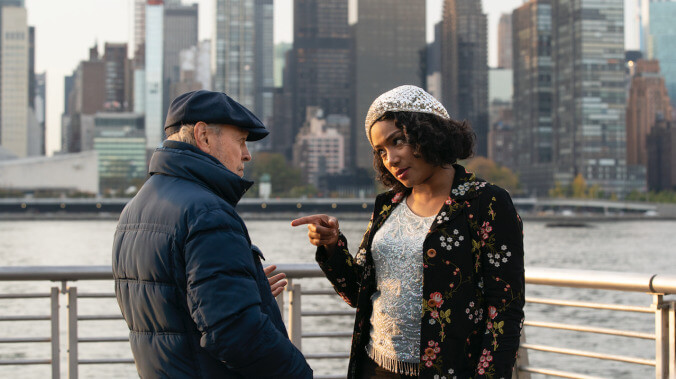It’s complicated for Billy Crystal and Tiffany Haddish in the awful dementia rom-com Here Today

Note: The writer of this review watched Here Today on a digital screener from home. Before making the decision to see it—or any other film—in a movie theater, please consider the health risks involved. Here’s an interview on the matter with scientific experts.
A deadly combination of enfeebled comedy and maudlin melodrama, Here Today stars Billy Crystal (who also directed, in his first stint behind the camera since HBO’s 61*, 20 years ago) as Charlie Burnz, a legendary comedy writer who’s still vital enough to be on staff at a fictionalized version of Saturday Night Live. We know that Charlie’s still got the goods not because his jokes are particularly funny but because the movie stops cold early on to have a couple of the younger writers question his continuing relevance, only to be lectured by their producer about the wealth of experience that he brings to the show. Respect your elders, kids! Especially because, like Charlie, they may secretly be suffering from dementia. While the guy can toss off zingers with aplomb, he’s increasingly having trouble remembering which health club locker is his, or how to get to the studio, or even whether the person he’s talking to is his own adult son. Nobody else is aware, however, apart from Charlie’s neurologist (Anna Deavere Smith), who suspects that he may have Creutzfeldt-Jakob disease—incurably degenerative, and usually fatal within a year.
Julianne Moore won an Oscar just six years ago for playing a similar role, but Here Today isn’t that kind of sober drama, alternating instead between silly and sudsy. In a blatant attempt to attract younger viewers, the film pairs Crystal with Tiffany Haddish, whose character, Emma, improbably shows up for a lunch with Charlie that her ex-boyfriend had purchased in a charity auction. Despite not having a clue who this “old man” (as she constantly calls him) is, Emma speedily becomes… well, it’s bizarrely unclear just what she becomes. Crystal no doubt knows that audiences would cringe were Charlie and Emma to hook up; at the same time, though, he evidently wants to emphasize that it’s not totally implausible. So Emma moves into Charlie’s house, spoons him in bed, and more or less shrugs whenever she’s asked whether the two of them are romantically involved. Half of Here Today arguably qualifies as the first rom-com to be built around the concept of plausible deniability.
That half is just barely tolerable, thanks to Crystal’s still-sharp timing and Haddish’s occasional bursts of raucous energy. (“Your little frail body would not be able to handle all these groceries,” Emma tells Charlie at one point, gesturing to herself. If Haddish didn’t improvise that line, she at least successfully creates the impression that she did.) Everything involving Charlie’s dementia, however, pushes well past earnest into sickly sweet. The movie’s big set piece sees him berate a cast member during the show’s live broadcast, stepping before the camera to yell at the guy for constantly stressing the wrong syllable of commonplace words and famous names. This is evidently meant to be at once hilarious and troubling, but the meltdown—despite being cowritten, along with the rest of the screenplay, by Alan Zweibel, one of SNL’s original writers—never takes off comedically and seems oddly irrelevant to Charlie’s illness. While dementia can cause personality changes, the film never gets into that, nor are there other such instances; apart from forgetting things, Charlie always seems entirely himself, and this rant could easily have taken place 25 years earlier. Is he meant to have forgotten that the show is live? If so, that doesn’t come across.
Not content with the horrors of losing one’s memory and sense of self, Crystal and Zweibel additionally saddle Charlie with lingering guilt about the death, many years earlier, of his beloved wife, Carrie, requiring him to reconcile with his daughter (Laura Benanti) while he can still remember why she resents him. This superfluous subplot demands flashbacks, but rather than digitally de-age himself, or cast a young lookalike, Crystal opts to have poor Louisa Krause, as Carrie, perform all of her scenes directly to the camera, representing Charlie’s point of view—a strategy that reduces a talented actor to painful mugging. (Similarly ludicrous are as-themselves cameos by Sharon Stone and Kevin Kline, who appear at a retrospective screening of a hit comedy that Charlie wrote: When we see a clip from this imaginary film, which would have been shot decades earlier, their characters talk in a fully darkened room while wearing Halloween masks that cover 90% of their faces.) Here Today’s sincerity is matched only by its phoniness. The same was true of Crystal’s 1992 directorial debut, Mr. Saturday Night, so at least one can say he hasn’t lost a step.